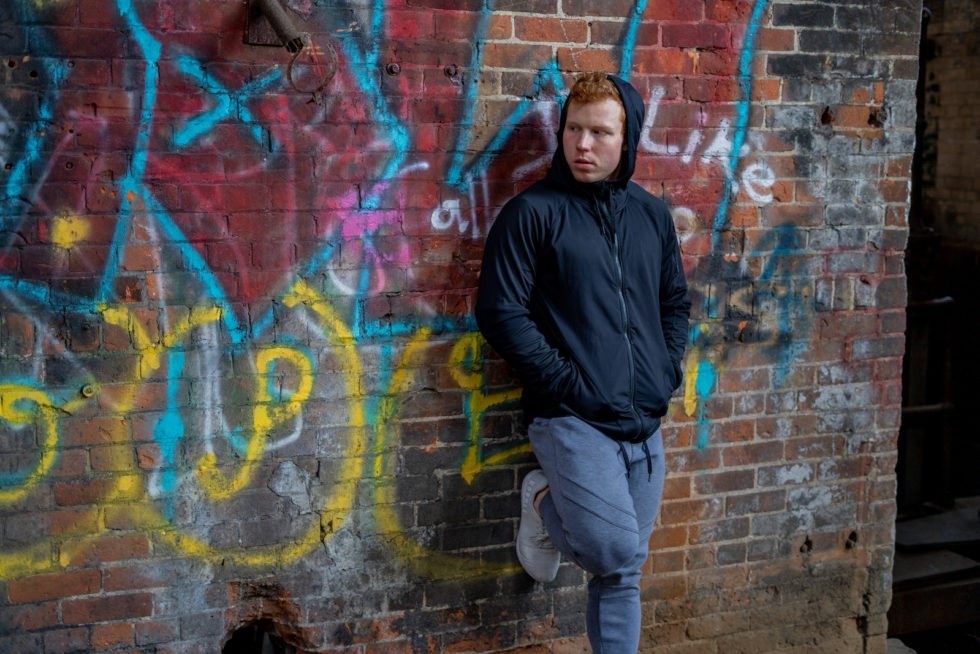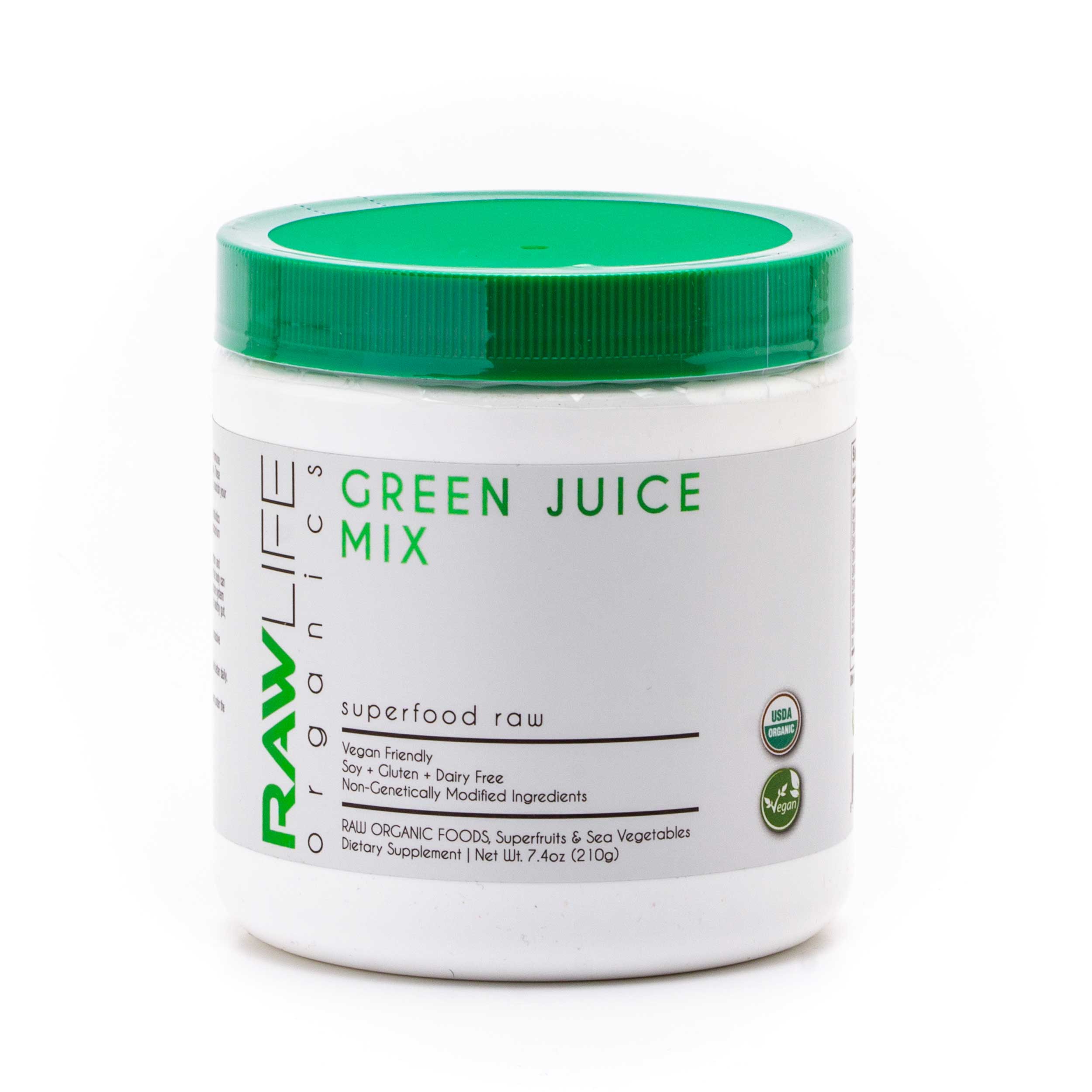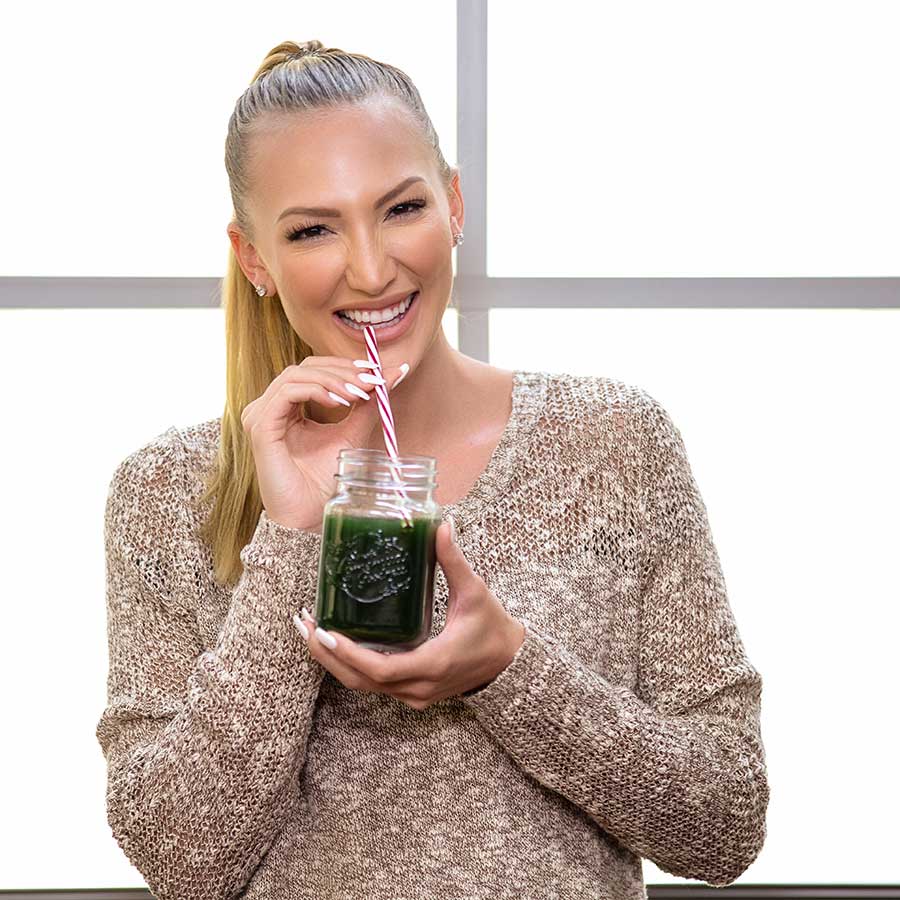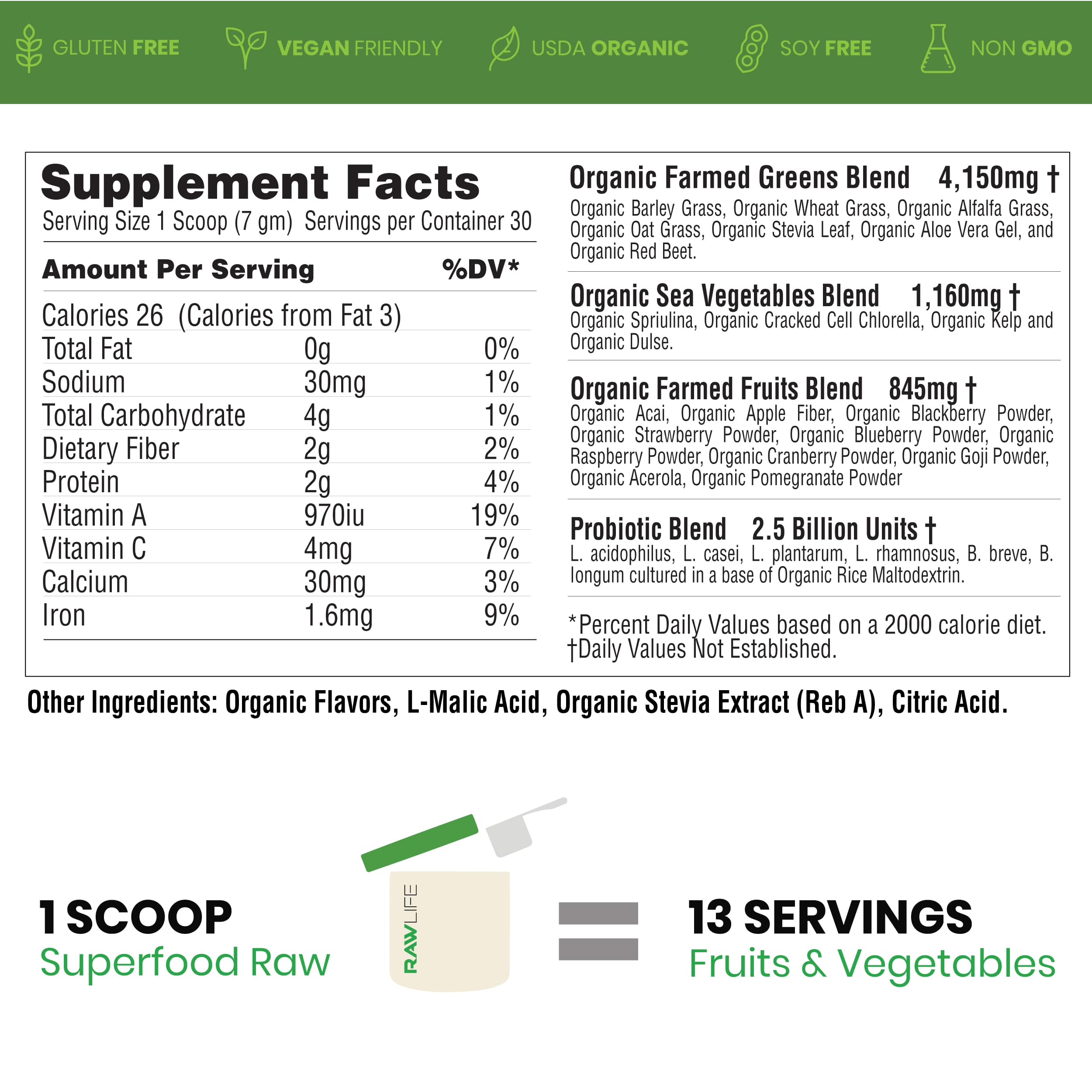After losing his father and dealing with obesity as a kid, Tanner Balazs turned his life around at 12 years old – and he wants you to know that changing your health and your life is all about perspective.
The fitness sector of social media can be a deceiving space to wander through. We look at fitness idols and assume it’s easy. They have insane skills and chiseled bodies and a perfect life – so they don’t struggle like us normal people, right?
CrossFit athlete Tanner Balazs will be the first to tell you that’s far from true.
Balazs grew up obese as a kid, getting bullied by classmates and siblings. It wasn’t until the death of his father when he was 12 that he saw his potential future before his own eyes in the cruelest way possible. But he turned it into an opportunity to create a better body and life for himself.
“Everything I had to overcome physically and mentally throughout my childhood has taught me so much not just about myself, but about fitness in general,” he says. “And now it has led me to a position where I can be self-employed and take on opportunities that I never thought I would.”
Balazs works as a personal trainer in his small hometown in Indiana, training clients of all ages and skill levels, passing on his knowledge and the life-changing power of fitness. But being an athlete his whole life, he found himself quickly rising in the ranks of the CrossFit world.
“I was training a client on a Sunday [Memorial Day], and the owner came in to set up the event. He asked me, ‘Hey, you doing Murph today?’ And I’m like, ‘What’s that?’ He explained the workout to me and I figured sure, why not. Sounded like it was for a great cause. I ended up doing the workout Strict in the 30 to 40-minute range – which was an elite time, from what I was told.”
He slowly started integrating CrossFit into his workouts, encouraged by people around him to pursue it seriously. In the 2019 Open last February, he placed in the top 200 competitors in the world and got hooked up with Max El Hag, one of the top coaches in CrossFit a few months after. Now Balazs is headed to Wodapalooza, one of the biggest CrossFit competitions in the country, at the end of February to compete with teammates.
“It’s somewhat surreal to think about how I went from being out of breath just walking up a flight of stairs to where I am now,” he says. “Everybody’s situation is different. But we all have the opportunity to either play the victim and use excuses as a crutch, or we can choose to assess, adapt, and advance.”
Read on to hear Balazs’ full story!

Noticing the Problem Early
Talk about a complete 180-degree flip with your health and body composition. What did health and fitness look like for you after high school sports?
I decided to play college football but got hurt during my freshman year. I’d already had a back injury from when I was younger (broken vertebrae and had to wear a full-body brace for 20 weeks), so I decided to hang it up with football and transferred to Indiana University to study exercise science. I still worked out throughout my college years but after my injury, I wanted to be functional and still train for aesthetics. So I was doing a little bit of everything: kettlebells, lifting weights, running, and sprints mostly. After my senior year of high school, I even did a bodybuilding prep with my best friend following a Jim Stoppani program. That’s when I started weighing food and it helped broaden my knowledge of nutrition.
And eventually, CrossFit entered the picture. What has it been like seeing your success so quickly over this last year?
Although there has been some fast success within the sport of CrossFit within my first year, its truly due to a combination of all the things I’ve failed and learned from, worked for, and been consistent with over the last 10 years. It’s very exciting knowing the potential that I have, but very humbling knowing there is so much work still to be done each and every day…and it can be taken from me at the blink of an eye so staying committed to the process, investing my best, and having continued gratefulness is key.

The Story
That’s so young – for him to pass on, and for you to lose your father. How did you handle that, and how did it change things for you moving forward with your health?
Once I started school, I signed up for this personalized P.E. class. It was basically more fitness-focused than game-focused like the P.E. class you might remember. I didn’t know much about fitness or nutrition at all, but I did know that I ate way too much junk and needed to stay out of the snack drawer. So I started eating salads and thought it was healthy to put significant amounts of dressing and stuff on them.
There is a mini-triathlon that our school does every year, and I wanted to try it out and do well. So during the summer between seventh and eighth grade, I started running and biking around this quarter-mile loop where I lived in town. I would run a lap and bike a lap, run a lap, bike a lap, for who knows how many hours. I was still eating the salads, but cutting back the fast food. Eventually, I cut out fast food and soda entirely. And I haven’t had either one of those since then. I ended up placing top 10 in the triathlon.
That probably motivated you to keep going! How did you continue to pursue health in your high school years?
Going into freshman year was when I made my massive physical transformation. I started working out for high school football and lifting weights, which I’d never really done before. I remember going into like GNC and buying protein powder for the first time too. I fell in love with the weight room and started going to the YMCA by myself on top of practices, and even signed up for advanced weight training in school. I was working out like four times a day and read every article I could about nutrition, supplements, and training. I was totally infatuated with it all.
Other people started taking notice, too. Girls began talking to me that I never thought ever would. Coaches came to me in school, wondering what I was doing and trying to get me to go out for their teams. I eventually went out for track and ran the 100 meter and the 4×100. When I went into my doctor for my physical as a sophomore, we saw that I had put on 18 pounds of muscle tissue that year.

Changing Habits
What did your health habits look like growing up? How did that affect your childhood?
Up until I was around 12 or 13 years old, I had terrible health habits. I ate fast food and drank two liters of pop multiple times a week. Papa John’s pizza was a regular thing on the weekends with buddies. I was so humiliated in swim class at school, I would get notes from my mom saying I was allergic to chlorine so I wouldn’t have to take my shirt off. I still played sports like baseball, basketball, wrestling, and football, but I knew I was overweight. Even my own brother would call me “fat boy” and things of that nature.
I was just being a kid and didn’t know any better, and my parents didn’t either. None of us really knew about the seriousness of my health or longevity, until my doctor told us during one of my physicals that we needed to make some changes. Shortly after that, going into my seventh grade year, my dad passed away. I started middle school two days later. My dad’s side of the family actually has a history of heart issues – very few of them have lived over 50. And he was 38. So that was a significant red flag.

Motivation
What motivates you when you have hard days? What keeps you coming back to the gym day after day?
I think it’s because I’ve dealt with adversity so much in my life already. This is hard, but it’s not the hardest thing I’ve ever done or dealt with. It’s all about your perspective. If you paint the picture in your mind that this is negative, then it’s going to be. Like we just saw with Kobe Bryant’s passing, we’re truly not promised tomorrow. I learned probably one of the biggest life lessons I’m ever going to learn firsthand at 12 years old: to not take anything for granted, and that includes my health. That’s enough for me just to work hard.
Tell us a little about your nutrition. What are some of your favorite healthy foods or meals?
I try to stay as whole and as real as possible, meaning foods that are not in a box, bag, wrapper, or bottle. Now obviously, there are exceptions like Vitamin Water Zero, or my favorites – Kodiak Cakes and Talty Bars. But the key there is reading nutrition labels. Everything I eat has a purpose. Even a cheat meal has a purpose – mental sanity. But, overall I’m eating whole foods and when I grocery shop, I stay as close as I can to the outside of the store.
I also don’t follow any one specific diet like paleo, keto, vegetarian, or whatever. I think at the end of the day, they’re all about restricting calories in some way, shape, or form. I’m a fan of balance, and the best diet for you to follow is the nutritional plan that’s going to be sustainable.
How do you stay on track, like when you travel or have a busier schedule?
Preparation is key. If I’m going to be traveling in a car for a while, then having something readily available before I go is critical. Instead of stopping at the gas station or going through drive-thru, have something in the car that keeps you on track and is purposeful for your goals. I’m on planes every month now, so having my hydration and quality snacks on hand are also important. That won’t lead me to be tempted to consume something I shouldn’t. I think the biggest thing is knowing what your ultimate goal is, and knowing that anything you consume is either going to help you progress or regress. If you don’t have the right process, you’re not going to make progress toward the product you want. If you want it bad enough, you’ll do what it takes to make it happen.

Advice
What advice do you have for people who feel like they don’t have a solid support system in place when they are trying to get healthy and change their exercise habits?
Of course, we care about and love those around us, our family, our friends, significant others. And we do respect their opinions. But I think there’s a fine line between respecting somebody’s opinion and totally consuming yourself with someone’s opinion. And at the end of the day, it’s your life. And there is a certain amount of selfishness when seeking your own satisfaction and purpose in life. No one is ever going to agree with everything you do. So if you ultimately know your mission and your goals, that’s what matters most. A lot of times when attacking a health goal, there are going to be sacrifices along the way. But the question I have for you is, if today was your last day on earth, would you want to go out knowing that you were living for somebody else’s opinion?
What would you say to encourage someone who wants to give up on their health goals?
I’d look them right in the eye and say, “If I can do it, you can too.” Someone might look at me now and not believe that, but once they understand where I came from, they can see it really is possible. It doesn’t matter how old you are. I’ve seen every scenario and every situation: people with bad genetics, people with extreme obesity. I’ve had clients who literally move nothing but their bodyweight in our sessions. They have a hard time getting in and out of their car. But they’re doing it. Anybody is capable of achieving what they want to. Now the process might be much longer, more strenuous, more stressful, and different for everyone. But everyone is capable.
If you were talking to someone who was brand-new to the gym or they’ve never tackled nutrition before, how would you suggest they get started?
I always tell people to do real research, and I don’t mean research on your favorite fitness girls’ Instagram. Dive into reputable research online. There’s more junk than there is good, but there is so much useful information out there. Also, surrounding yourself with people that have similar goals to you is huge. I’m a firm believer that you are who you hang out with – if you hang out with five bad people, you’re probably going to be the sixth. And finally, coming up with a plan that allows you to succeed. Everyone wants a quick fix but finding a method that sticks is going to lead to success. If you can’t do it every day, it’s going to be a constant yo-yo. Above all, believe in yourself. There’s going to be adversity, there’s going to be tough times, but keeping your eyes on the prize and battling through will get you there.
And finally, how do you use Raw Life Organics in your daily routine?
I use my greens powder once a day, every day. That’s a guarantee. For example, today, I had my greens post-workout with my shake, but sometimes I’ll wake up and I’ll have them first thing in the morning with a protein shake and whatever I eat for breakfast. Everybody’s going to pull something different from a supplement, but for me, the three main benefits with the RLO greens are the digestion, immunity, and energy. These are all important because it’s going to affect my mood and the way I train, recover, and think.
ON THIS BLOG
Superfood Raw Green Juice Mix
$39.99
Get Nature’s Most Powerful Superfoods in one scoop and 30 seconds a day without all the hassle and expenses of juicing. Now you can be confident that you are getting everything you need for optimal health!
- Increase Overall Energy
- Reduce / Eliminate Bloating
- Support Gut Health
- Empower Your Immunity




